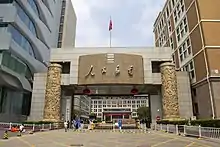Ministry of Industry and Information Technology
The Ministry of Industry and Information Technology is the sixth-ranked executive department of the State Council of the People's Republic of China. It is responsible for regulation and development of the postal service, Internet, wireless, broadcasting, communications, production of electronic and information goods, software industry and the promotion of the national knowledge economy.
| 中华人民共和国工业和信息化部 Zhōnghuá Rénmín Gònghéguó Gōngyè Hé Xìnxīhuàbù | |
 | |
| Agency overview | |
|---|---|
| Formed | March 2008 |
| Superseding agency |
|
| Type | Constituent Department of the State Council (cabinet-level executive department) |
| Jurisdiction | Government of China |
| Headquarters | Beijing |
| Minister responsible | |
| Parent agency | State Council |
| Child agencies | |
| Website | www |
| Ministry of Industry and Information Technology | |||||||
|---|---|---|---|---|---|---|---|
| Simplified Chinese | 中华人民共和国工业和信息化部 | ||||||
| Traditional Chinese | 中華人民共和國工業和信息化部 | ||||||
| |||||||
History
The State Council announced during the 1st session of the 11th National People's Congress that the Ministry of Industry and Information Technology would supersede the Ministry of Information Industry (MII).[1]
In 2013, the ministry's 'Made in China 2025' plan was approved by the State Council. It took over two years to complete by one hundred and fifty people. The plan's aim is to improve production efficiency and quality.[2]
Functions
The ministry is responsible for industrial development, policy, and standards. It also oversees industry operations monitoring, innovation, and information technology.[3]
The ministry is known for drafting regulations that lays the groundwork for censorship.[4] In 2006, the Human Rights Watch said that the ministry is responsible for overseeing technical implementation of the censorship in China.[5]
The ministry is responsible for the current iteration of the Thousand Talents Plan called Qiming.[6]
Organization
The ministry administers the State Administration of Science, Technology and Industry for National Defense, and the State Tobacco Monopoly Bureau.[7] The MIIT was historically responsible for the nation's tobacco control, including over the implementation of the WHO Framework Convention on Tobacco Control, but this task was assigned to the National Health Commission as part of a large-scale government reform in 2018.[8] Under the arrangement "one institution with two names", the MIIT reserves the external brands of the China National Space Administration and the China Atomic Energy Authority.[3]
The MIIT oversees the China Academy of Information and Communications Technology, a government think tank that focuses on telecommunications and the digital economy. It also oversees seven universities, including top universities such as the Beijing University of Aeronautics and Astronautics, the Beijing Institute of Technology, the Harbin Institute of Technology, and the Northwestern Polytechnical University. The MIIT also co-manages the China Integrated Circuit Industry Investment Fund, used by the government to invest in semiconductor companies, together with the Ministry of Finance.[3]
Structure
List of ministers
| No. | Name | Took office | Left office |
|---|---|---|---|
| Minister of Information Industry | |||
| 1 | Wu Jichuan | March 1998 | March 2003 |
| 2 | Wang Xudong | March 2003 | March 2008 |
| Minister of Industry and Information Technology | |||
| 3 | Li Yizhong | March 2008 | December 2010 |
| 4 | Miao Wei | December 2010 | August 2020 |
| 5 | Xiao Yaqing | August 2020 | July 2022 |
| 6 | Jin Zhuanglong | July 2022 | Incumbent |
List of party secretaries
| No. | Name | Took office | Left office |
|---|---|---|---|
| Ministry of Industry and Information Technology | |||
| 1 | Li Yizhong | March 2008 | December 2010 |
| 2 | Miao Wei | December 2010 | July 2020 |
| 3 | Xiao Yaqing | July 2020 | July 2022 |
| 4 | Jin Zhuanglong | July 2022 | Incumbent |
See also
References
- "工业和信息化部英文译名确定 新网站将上线_科技频道_新华网". news.xinhuanet.com. Archived from the original on 2008-07-05.
- Kennedy, Scott (June 2015). "Made in China 2025". Center for Strategic and International Studies. Retrieved 2015-07-14.
- "Decoding Chinese Politics". Asia Society. Retrieved 2 October 2023.
- Shih, Gerry (30 March 2016). "China proposes new Web rules that could enhance censorship". Associated Press. Retrieved 2023-02-11.
- ""Race to the Bottom": Corporate Complicity in Chinese Internet Censorship: II. How Censorship Works in China: A Brief Overview". www.hrw.org. Retrieved 2023-02-11.
- Zhu, Julie; Potkin, Fanny; Baptista, Eduardo; Martina, Michael (2023-08-24). "China quietly recruits overseas chip talent as US tightens curbs". Reuters. Retrieved 2023-08-26.
The primary replacement for TTP is a program called Qiming overseen by the Ministry of Industry and Information Technology
- "Beijing opens green super-ministry | The Australian". Archived from the original on 2009-08-27. Retrieved 2008-03-22.
- Leng, Sidney (15 March 2018). "China's ministry in charge of tobacco control had ties to the industry. Not anymore". South China Morning Post. Retrieved 2018-03-16.